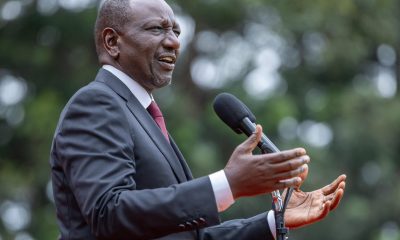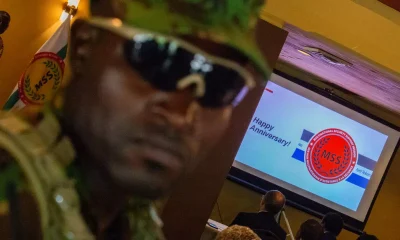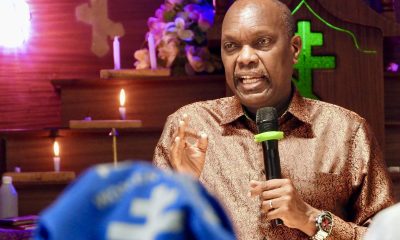News
Ready: Kenya Police To Start Arriving In Haiti This Month, US Military Readies Their Camps
The officers said they received physical and weapons training from Kenyan and American security personnel and were given details about how Haitian gangs operate.
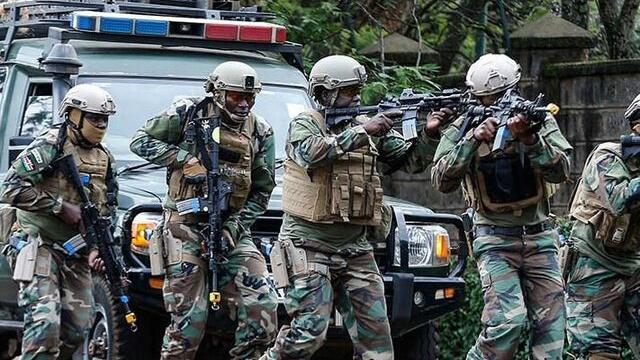
Ready, that is the statement of the government as Kenya is prepared to dispatch several hundred police officers from the multinational force to Haiti.
This is the first cohort of officers who have already received appropriate training and been recalled from leave this week, according to information reported by the New York Times (NYT) on Tuesday.
Kenya will deploy close to 1,000 police officers to Haiti for a peace enforcement mission, just 14 days before President William Ruto’s state visit to the United States on May 23, according to sources familiar with the matter.
The American newspaper reports that the selection process for officers to be deployed happened last year in October.
Citing insider information, it’s reported that some 400 officers were chosen for the first deployment and began training, with an additional 100-member support staff that includes medics. Another, similarly sized group would also prepare to deploy soon.
The officers said they received physical and weapons training from Kenyan and American security personnel and were given details about how Haitian gangs operate.
They also took French classes and lessons on human rights and Haiti’s history. The police officers said they were aware of previous failed international interventions in Haiti. But they argued that those interventions had been largely viewed by Haitians as occupation forces, while their goal is to support the local police and protect civilians.
Besides the prestige that comes with serving abroad, officers said the additional pay that comes with their service is another motivation.
The officers were chosen from Kenya’s General Service Unit and the Administration Police, two paramilitary units tasked with dealing with everything from riots and cattle rustling to protecting borders and the president.
Other countries involved in Haiti
The multi-national force mission, sanctioned by the UN Security Council, will be spearheaded by the Kenyan police and is aimed at curbing gang violence in Haiti following the installation of a new American-backed transitional government.
More than 100 Air Force aircraft are expected to arrive and leased by the U.S. Department of State.
In that context, the Haitian National Police (PNH) could be receiving reinforcements from foreign troops since May 26.
So far, seven countries in Africa, Asia and the Caribbean have shown their willingness to provide men for the Multinational Security Support Mission, which will be deployed in Haiti.
These countries are Kenya – which offered to lead the operations – Benin and Chad among Africans; Bahamas, Jamaica and Barbados among the Caribbean countries, as well as Bangladesh. Suriname recently announced that it will send a group of troops to Haiti.
Among the nations mentioned, Chad and Bangladesh have experience in international deployments in peace missions, but the United Nations (UN) has always made it clear that now the task will be to support the PNH in the fight against armed gangs.
Jitters
However, Kenyans are increasingly getting jittery about the mission. In January a Kenyan court rejected the plan to send police officers to Haiti.
Kenya had initially aimed to enter Haiti in early January, but legal obstacles and a power vacuum delayed the plan.
Despite facing challenges, Nairobi, according to President Ruto, remains committed to sending its forces to the gang-afflicted Caribbean nation to help restore order.
The Miami Herald reported last week that American civilian contractors have begun arriving in Haiti to assist in preparing for the arrival of Kenyan police, according to a top official from the administration of US President Joe Biden.
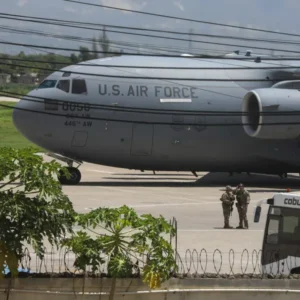
A U.S. military cargo plane arrived on Saturday at Toussaint Louverture International Airport in Port-au-Prince. An operations base for the international mission is being set up at the airport.Credit…Odelyn Joseph/Associated Press
The Pentagon, already having committed Sh26 billion to support the mission, is tasked with preparing a base for the incoming forces.
According to Todd D. Robinson, the US assistant secretary of state for the Bureau of International Narcotics and Law Enforcement Affairs, an initial deployment of Kenyan police officers is being coordinated to coincide with the arrival of Ruto in Washington later this month.
State visit
The White House confirmed that Biden and First Lady Jill Biden will host Ruto and his wife Rachel for a state visit on May 23, commemorating the 60th anniversary of US-Kenya diplomatic relations.
Robinson declined to give an exact date or the number of officers to be deployed as part of the long-awaited multinational security support mission.
Washington is reported to have transported civilian contractors to support the Pentagon to build out the area where the Kenyan support mission will stay while in Haiti.
But Republican lawmakers in Congress have ignored a request by the State Department to release Sh5 billion of the Sh13 billion it has pledged to support the mission.
The American administration has been criticised for not giving lawmakers clear details about the force. UN member states have shown reluctance towards the mission, possibly signalling fatigue within the international community regarding interventions in Haiti.
Despite the substantial funding required for the mission, countries are seemingly turning a blind eye, with the UN deployment fund currently at only Sh2 billion.
“The funds were provided by Canada, France, and the United States,” said Stephane Dujarric, spokesperson for UN Secretary-General Antonio Guterres.
He noted that Kenya, The Bahamas, Bangladesh, Barbados, Benin, Chad, and Jamaica had notified the UN Secretary-General in writing of their intention to provide boots, as requested by the UN Security Council.
The Haitian police, having been outgunned and outnumbered, have struggled to curb gang violence. In some cases, they’ve been unable to stop invasions of neighbourhoods and the takeover of police stations as the gangs tightened their grip on the capital Port-au-Prince.
The police have succeeded in fighting back attempts to take over the National Palace, the Central Bank, and the international airport, which they’ve protected with help from members of the small Haitian Army.
Frank Elbe, director general of the Haiti National Police, indicated that since the attacks began on February 29, his officers had not only engaged in combat with the gangs but also constructed a buffer zone surrounding the airport.
Elbe’s residence was set on fire by gangs during the chaos. “
We’ve reinforced the security perimeter inside and outside of the airport,” he said.
“The police have carried out a lot of operations that have allowed for improvements in the security at the airport. We’ve also demolished a lot of houses.”
He said the goal is to build the confidence needed for US airlines to resume commercial flights to Haiti, which have been suspended since March 4.
“The second phase of our strategy is to dismantle the gangs and create a space where the government can provide services to neighbourhoods once occupied by gangs,” he said.
That is where the foreign forces, led by Kenya, will help, Elbe said.
“They can help us in the operations that we are going to do to dismantle the gangs.”
While Ruto’s government says Kenya is now ready to deploy to Haiti, some fear the mission will fail as not enough police officers will be sent to fight the gangs.
Haitian gang leaders have vowed to fight the deployment, raising concerns of even worse violence in a country where thousands of people have been killed in recent months and more than 350,000 have fled their homes in the past year.
Ruto’s critics have accused him of illegally pursuing the deployment and not publishing a document stipulating how Kenyan forces can operate in Haiti. They also plan to file another legal challenge accusing his administration of contravening earlier court orders around the mission.
International obligations
Ruto cites the need to support a “mission for humanity” and ensure Kenya fulfils its international obligations.
He commissioned church leaders to meet with Haitian law enforcement, military representatives, and a gang leader to discuss Kenya’s security mission.
In March, as armed groups escalated their insurgency in the capital Port-au-Prince and plunged Haiti deeper into a historic humanitarian crisis, Kenyan pastors advising President Ruto’s government met for three days at a hotel in Nairobi to pray for the police officers.
In a serene sky-blue conference room within the confines of the Weston Hotel, three Kenyan pastors convened with Haitian and American ministry leaders alongside Kenya’s ‘praying’ First Lady Rachel Ruto.
In 2021, assassins killed former Haitian President Jovenel Moise at his residence in Port-au-Prince. In late February, gang-related violence halted operations at the country’s main airport, leaving several police officers dead and paralysing the capital.
Kenya Insights allows guest blogging, if you want to be published on Kenya’s most authoritative and accurate blog, have an expose, news TIPS, story angles, human interest stories, drop us an email on [email protected] or via Telegram
-

 Grapevine2 weeks ago
Grapevine2 weeks agoRussian Man’s Secret Sex Recordings Ignite Fury as Questions Mount Over Consent and Easy Pick-Ups in Nairobi
-

 News6 days ago
News6 days agoTHE FIRM IN THE DOCK: How Kaplan and Stratton Became the Most Scrutinised Law Firm in Kenya
-

 Investigations1 week ago
Investigations1 week agoMulti-Million Dollar Fraud: Three Kenyans Face US Extradition in Massive Cybercrime Conspiracy
-

 Economy7 days ago
Economy7 days agoIran Demands Arrest, Prosecution Of Kenya’s Cup of Joe Director Director Over Sh2.6 Billion Tea Fraud
-

 Business1 week ago
Business1 week agoA Farm in Kenya’s Rift Valley Ignites a National Reckoning With Israeli Investment
-

 Africa1 week ago
Africa1 week agoFBI Investigates Congresswoman Ilhan Omar’s Husband’s Sh3.8 Billion Businesses in Kenya, Somalia and Dubai
-

 Politics2 weeks ago
Politics2 weeks agoSifuna, Babu Owino Are Uhuru’s Project, Orengo Is Opportunist, Inconsequential in Kenyan Politics, Miguna Says
-

 Grapevine2 days ago
Grapevine2 days agoA UN Director Based in Nairobi Was Deep in an Intimate Friendship With Epstein — He Even Sent Her a Sex Toy





